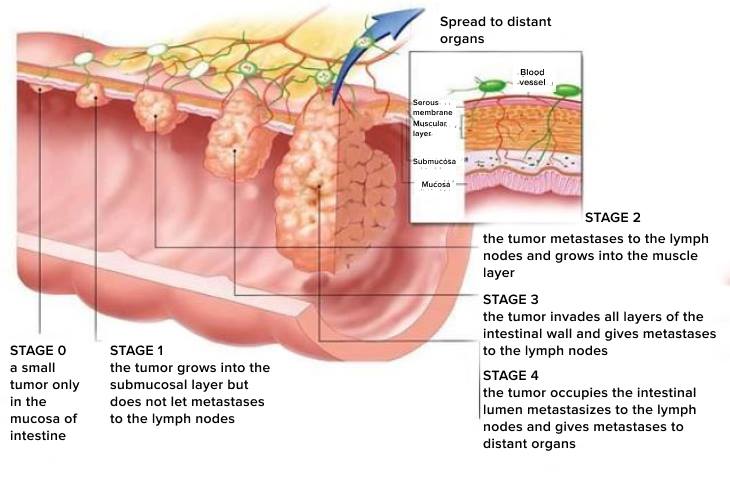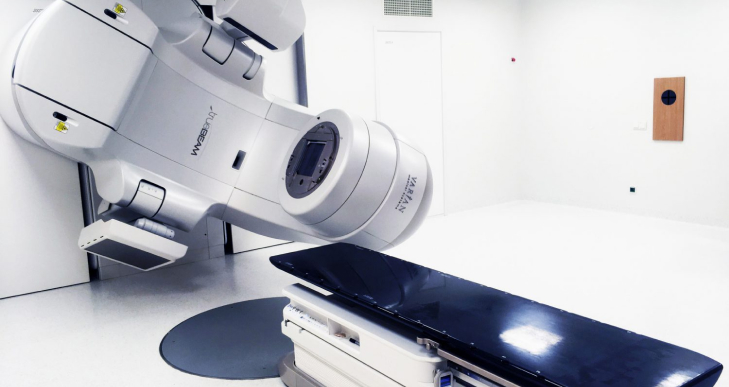Calls for Ukraine
Calls for Europe
Calls for USA

Colorectal cancer – a malignant tumor of the mucous membrane of the colon. This is a broad oncological concept in which rectal cancer is most common. The disease begins when healthy cells in the lining of the colon change and begin to proliferate uncontrollably. The neoplasm can spread to neighboring tissues and organs, gradually affecting the entire body.
If the diagnosis sounds like “colorectal cancer“, it usually means colon cancer or bowel cancer, since tumors of the small intestine are relatively rare. In the west, the term colorectal carcinoma is more commonly used.
The exact causes of bowel cancer have not been established, but there are a number of factors that affect the likelihood of developing it.
Most often, colorectal cancer begins with the appearance of a polyp – not a malignant growth. If it isn’t removed in time, it can progress to a cancerous tumor. Adenomatous polyps (precancerous formations growing on the surface of the colon) are classified as dangerous.
Patients with autoimmune bowel diseases such as Crohn’s disease and ulcerative colitis develop colorectal cancer in 15-30% of cases.
Infection with oncogenic HPV types (human papillomaviruses) increases the risk of colorectal cancer and, to the greatest extent, the development of rectal cancer.
People who don’t have a diet high in fiber are at risk for colorectal cancer. Eating red meat (pork, beef) more often 2-3 times a week, the presence of nitrates in foods greatly increases the likelihood of rectal cancer.
Obesity increases the risk of colorectal cancer by about 1.5 times, mostly in men.
A family history of a number of cancers and hereditary syndromes increase the chances of developing malignant tumors in relatives. Among them is Lynch’s syndrome (hereditary mutation in genes).
The American Cancer Association estimates that 3 out of 100 cases of rectal cancer are caused by Lynch syndrome. At the same time, rectal cancer is often diagnosed in relatives. If the patient is aware of such cases in his family, prophylactic colonoscopy should be started no later than 35 years of age.
One of the reasons why people turn to an oncologist at a late stage is the asymptomatic onset of the disease. The first signs of rectal cancer are similar to other diagnoses. Often the patient doesn’t experience significant discomfort until the disease progresses.
Colorectal cancer patients may have the following symptoms:
Signs of advanced rectal cancer:

In order for the oncologist to be able to make an accurate diagnosis and prescribe an effective treatment, the patient needs to go through a full diagnostic cycle:
PET-CT is a reliable method for diagnosing cancer. Combines the capabilities of positron emission (PET) and computed tomography (CT). Allows to establish a malignant tumor and metastases with high accuracy.
Without this procedure, a foreign doctor has no right to diagnose and prescribe treatment.
Examples of the cost of PET-CT in clinics around the world:
The scientific communities for the study of colorectal cancer (American College of Gastroenterology, American Cancer Society, American College of Radiology) recommend primary diagnosis and regular check-ups:
Among Europeans, the 5-year survival rate is: in Switzerland – about 50%, in Finland, the Netherlands and Spain – 40%; in Italy, Denmark, Great Britain, Germany and France – 35%; in Estonia and Poland – less than 30%.
In economically developed countries, survival rates are significantly higher than in the CIS.
Due to late diagnosis, mortality from colorectal cancer reaches 40% within a year from the moment the disease is detected.
If a patient undergoes high-quality diagnostics and receives the right treatment, he overcomes the 5-year survival milestone.
Oncologists determine the stage of cancer depending on the size of the tumor and the area of its spread.

Detected either during random examinations (check-up or for another reason) or if the tumor is visually localized (anal canal).
Treatment for the 1st stage of rectal cancer is an organ-preserving operation.
IIB can manifest, but more often doesn’t have pronounced symptoms.
Treatment 2nd stage of colorectal cancer is surgery, often including chemoradiotherapy before surgery.
The third stage often appears bleeding due to the growth of the tumor into the vessels and surrounding organs.
Treatment of the third stage of rectal cancer includes 3-4 courses of chemotherapy and simultaneous radiation therapy. After that, the surgeon performs the operation in an open or laparoscopic way.
Even 10 years ago, at the 4th stage of colorectal cancer, radical treatment was out of the question. Now, if it is possible with the help of therapy to reduce the tumor to operable limits, and the removal of metastases will not lead to life-incompatible disorders, doctors are conducting radical treatment.

Depending on the stage of the cancer and the general condition of the patient, doctors may prescribe a combination of treatments. Foreign specialists most often supplement surgical treatment with immunotherapy and irradiation sessions at new generation devices.
Surgery is the primary treatment for rectal tumors, according to the American Cancer Association. The type of surgery used depends on the stage of the cancer.
Types of surgery for rectal cancer:
The operation allows the patient to maintain a normal digestive process and defecation. The oncosurgeon removes a tumor up to 5 cm in size through the anus without damaging it. This technique is suitable for the surgical treatment of stage 1-2 cancer.
The surgeon performs such an operation when it is necessary to excise not only the tumor, but also the affected lymph nodes. Laparoscopy allows you to save more healthy tissue, because the doctor removes the neoplasm through 3-5 punctures with a diameter of 0.5-1 cm.
This operation is performed if metastases have spread to neighboring areas of the intestine, lymph nodes and other organs. In this case, the doctor removes the tumor through an incision up to 15 cm in the lower abdomen.
Examples of the cost of operations on the Da Vinci robot for rectal cancer in hospitals in different countries:

Depending on the stage of the cancer and the patient’s condition, oncologists may prescribe different therapy regimens.
Chemotherapy is prescribed to treat rectal cancer at any stage. It is used: as an independent method of treatment, before surgery (to reduce the swelling) or after surgery (to reduce the risk of recurrence).
During the operation, the patient has the tumor removed, and then a chemotherapy drug, heated to 41-43 ° C, is injected into the abdominal cavity. Due to the high temperature, it penetrates deep into tissues and destroys more cancer cells than traditional chemotherapy.
Oncologists use large doses of radiation that act precisely on the neoplasm and don’t damage healthy parts of the body.
Before the radiation therapy session, the patient is sedated.
Targeted therapy drugs act exclusively on a malignant tumor. Targeted therapy stops the process of cancer cell division and destroys the vessels that supply the neoplasm.
The drugs activate the patient’s immune system: they aim the process at recognizing and attacking the tumor.
Examples of the cost of HIPEC intraperitoneal chemotherapy in clinics in different countries:
The total cost is influenced by the volume of examinations and the treatment prescribed by the doctor. It depends on the stage of the cancer, drugs and surgery.
If the patient chooses treatment abroad, then the costs increase due to the organization of the flight and accommodation for the accompanying persons. Leave a request and our coordinating doctors will select the best option for you.
Detected either during random examinations (check-up or for another reason) or if the tumor is visually localized (anal canal).
Treatment for the 1st stage of rectal cancer is an organ-preserving operation.
IIB can manifest, but more often doesn’t have pronounced symptoms.
Treatment 2nd stage of colorectal cancer is surgery, often including chemoradiotherapy before surgery.
The third stage often appears bleeding due to the growth of the tumor into the vessels and surrounding organs.
Treatment of the third stage of rectal cancer includes 3-4 courses of chemotherapy and simultaneous radiation therapy. After that, the surgeon performs the operation in an open or laparoscopic way.
Even 10 years ago, at the 4th stage of colorectal cancer, radical treatment was out of the question. Now, if it is possible with the help of therapy to reduce the tumor to operable limits, and the removal of metastases will not lead to life-incompatible disorders, doctors are conducting radical treatment.
Please rate the work of MedTour
